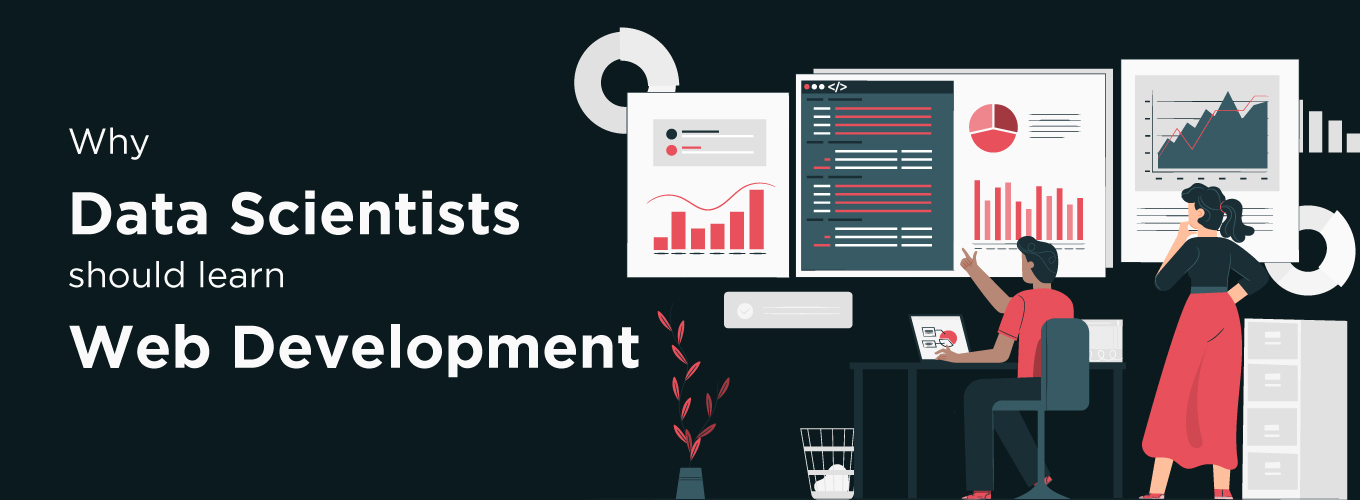Data scientists are among the most in-demand professionals across industries as businesses increasingly depend on data-driven insights to innovate and stay competitive. From healthcare to finance, companies are leveraging the power of data to create better solutions, products, and strategies. However, excelling as a data scientist requires more than just expertise in statistics and algorithms. To stand out in this evolving field, learning web development can be a game-changer. In this blog, we’ll explore why web development is required for data science and how to approach it effectively.
Career in Data Science
A career in data science is one of the most promising and lucrative paths in today’s business landscape. Popularized by an HBR article as “the sexiest job of the century,” data science plays a critical role in assisting organizations to harness the power of data to drive innovation and efficiency. Combining elements of statistics, business strategy, and advanced computing, data science focuses on studying patterns, extracting insights, and building predictive models to solve real-world challenges.

The rise of cognitive and IoT technologies has given companies access to vast amounts of consumer data. Data scientists, armed with expertise in data mining, machine learning, and AI, process this information to uncover valuable insights. These insights help businesses understand customer behavior, improve product development, streamline operations, and enhance targeted marketing strategies.
As companies across industries increasingly depend on data to stay competitive, data science has emerged as a highly sought-after field, offering exceptional career growth and opportunities for those with the right skill set.
Data Science vs Web Development: Key Differences
While data science is a highly promising career, why should data scientists consider studying web development? The answer lies in the nature of their work. Web development focuses on creating and designing websites and web applications, blending functionality with aesthetic appeal. In today’s digital-driven world, where businesses generate significant profits from online platforms, web developers play a crucial role in collaborating with business and marketing teams to craft interactive user experiences that add immense value to organizations.
The primary distinction between these fields is in their roles within the product lifecycle. Data scientists and analysts conceptualize products by building predictive models and deriving insights, while web developers and software engineers work to bring those concepts to life through functional and user-friendly interfaces. By learning web development, data scientists can bridge this gap and take their ideas a step further, transforming insights and models into actionable, accessible, and impactful tools.
This synergy of skills equips data scientists to harness the full potential of their work, enabling them to contribute more holistically to their organizations. Keep reading to discover the benefits of data scientists acquiring web development expertise.
Why Should a Data Science Expert be Required to Learn Web Development?
Here are the key reasons why web development skills are required for a data science expert to elevate a career from building standout portfolios to improving collaboration and unlocking diverse opportunities.
1. Build an Impressive Self-Hosted Portfolio
A strong portfolio is crucial to making a lasting impression on recruiters. Without web development skills, you may need to rely on third-party platforms to showcase your work. By learning web development, you can create a self-hosted website or Git profile, giving you full control to design an interactive and visually appealing portfolio. It allows you to present your models, analyses, and insights in a way that stands out while reducing costs and enhancing your professional image.
2. Improve Team Collaboration
Creating a successful data product requires teamwork. Having knowledge of web development and tech stacks enables you to engage with developers more effectively, fostering a shared understanding. This deeper collaboration ensures smoother communication, aligning your data science models with the development process and turning your ideas into actionable solutions powered by AI.
3. Meet Rising Industry Expectations
As demand for data scientists increases, so do expectations. The role, still evolving, often leaves companies expecting data scientists to deliver beyond conceptual models. By acquiring software development skills, you position yourself as a flexible professional capable of taking projects from ideation to execution, meeting industry demands with agility and effectiveness.

4. Align Job Expectations with Reality
For aspiring data scientists, the expectation is often to solve advanced machine-learning problems and drive business growth. However, real-world roles may differ, and learning web development can bridge this gap. It equips you to transform ideas into functional applications, enabling you to meet job expectations while achieving career satisfaction.
5. Explore Diverse Career Opportunities
Data science is a broad field with overlapping roles, such as Business Intelligence Developer and Machine Learning Specialist. These roles often demand both analytical expertise and proficiency in software development. Acquiring web development skills can open doors to specialized positions, making you a versatile professional in the job market.
6. Add an Exciting Skill to Your Arsenal
If you enjoy learning new skills, web development is an excellent choice. It’s a fulfilling, creative, and practical skill that not only diversifies your expertise but also enhances your value as a data scientist, positioning you for greater success in your career.
Enhancing Data Scientist Careers with Web Development Skills
While web development skills are not a strict requirement for data scientists, they can significantly enhance their careers. While specializing in data mining or machine learning algorithms can make you stand out, gaining knowledge in web development helps bridge the gap between theoretical models and practical implementation.
Collaborating with web developers and software engineers is often essential in a field heavily influenced by AI and machine learning. Therefore, web development can serve as a valuable skill to bring your data-driven solutions to life and open up new opportunities for growth and impact.


